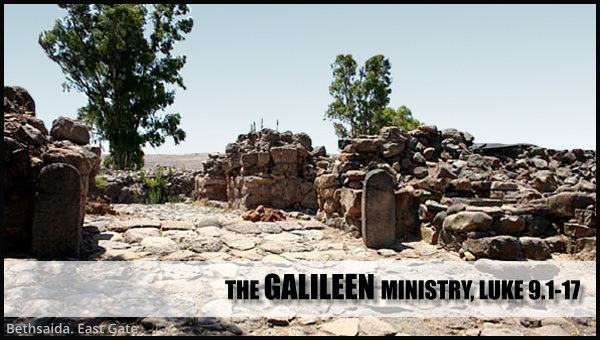By Tyson Thorne

The Galilean Ministry at Various Cities (4.14-9.50), 9.1-17
To assure the disciples were learning all that he was teaching, Jesus sent the 12 on a Field Trip. Just as Jesus proclaimed his message through both word and deed, so to ought the disciples. To meet this requirement Jesus passed along his authority over demons and disease to the disciples so that they were empowered to share in his work. Aside from this new authority they were to take only the clothes on their back. All who welcomed them were to be blessed, and all who didn’t were to be treated as Gentiles – those who had not part in the kingdom.
Matthew goes into much greater detail about this than Luke, also including the sending out of the 72 after this successful trial. Can you imagine all these men traveling about from city to city proclaiming Jesus’ message and healing the sick and exorcising demons? It was what we would today call a “grassroots movement” that suddenly catapulted into the public’s awareness. Even one traveling Rabi who heals is remarkable, but 12 – then 72 – others doing the same in his name is extraordinary. Is it any wonder that Jesus finally gained the attention of the political class?
Luke puts the narrative on hold to clue us in on what is taking place in the body politic. The Tetrarch (“Governor” in modern parlance) Herod had been hearing reports of this man Jesus. He asked his people, quite casually I’m sure as this was not an official investigation, who Jesus was. Three possibilities kept rising to the surface: Jesus was either a resurrected John the Baptist, the prophet Elijah returning to his people, or someone who came in the style and authority of an ancient prophet. These three notions will come into play again very soon (verse 19 of this chapter, to be exact). Herod, who had John the Baptist beheaded earlier, rejected the notion that Jesus was John. That Jesus was Elijah or a modern prophet in the old tradition he could not be so sure. One thing was certain, Herod wanted to find out.
We are then returned to the narrative and find that the disciples had returned, their faith and spirits buoyed from the experience. Following the debriefing they retreated to Bethsaida for some downtime, but the multitudes found out and soon followed. All this is leading up to a story familiar to most Christians (since it is the only one of Jesus’ miracles contained in all four Gospels), the Feeding of the 5,000. Well, there are 5,000 men present, so there was likely over 10,000 people present when one includes women and children. Evidently they were not locals, for they could not return home for food and sleep. Which raised an issue the disciples noticed and went to Jesus about.
“Time to send them away”, said Peter, “so they can find someplace to eat and stay the night.” Jesus’ reply always seemed incomplete to me. There should be something before the words Luke records, something like, “You don’t send them away, Peter. You give them something to eat.” Looking at it in the original language Jesus’ response makes a bit more sense. The “You” is emphatic, meaning, “You, Peter, you give them something to eat.” The two small fish they had may have in fact been Peter’s contribution, he being a fisherman. Jesus was about to perform a miracle, multiplying the fish and the bread they had to feed all those people! In a way then, if Peter had caught the fish, Peter did feed the people.
Before the miracle was performed, however, Jesus looked toward heaven and prayed a blessing for the food. This is an easy action to overlook, so accustomed are we to praying a blessing over our own meal, but this is the first time we see Jesus doing so. It would be forgivable to think this had something to do with the miracle about to be performed, but it isn’t. This is evident from two other later prayers of Jesus that are very similar, occasions on which no miracle was performed (Luke 22.19 and 24.30). The other two events are the Last Supper and a meal where Jesus reveals himself to some of the disciples after his resurrection. These blessings are markers for significant events in the book of Luke which makes one wonder, what is significant about this event besides the miracle? Quite simply, it is the moment when the disciples were finally convinced with all certainty that Jesus was the Messiah. This assertion is not mentioned in the text itself, but is something I’ll happily prove next time.
|
|
